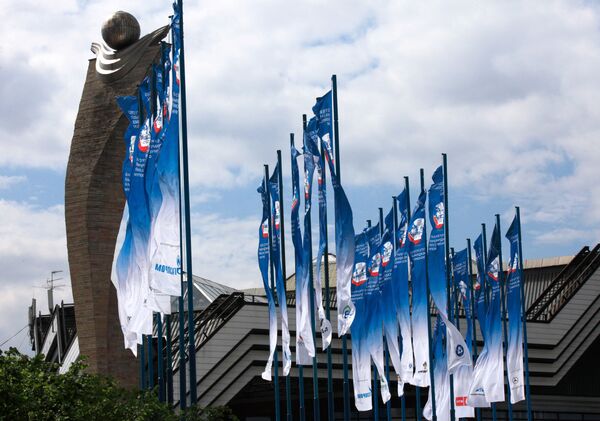The purpose of the St. Petersburg International Economic Forum, which ended on June 19, was to "lay the foundation for the future." And most participants at the forum seemed convinced that the future will be bright.
Russian delegates painted a rosy picture in which competition is robust, bureaucratic barriers are a thing of the past, and the public and private sectors perfectly complement each other in Russia's innovative economy.
On the forum's last day, French President Nicolas Sarkozy evoked a no less idealistic picture of Europe's future.
But both pictures of the future are marred by unresolved problems in the present.
Word and deed
For decades now, economists, sociologists and political scientists have been debating the meaning of "modernization" and trying, without success, to create a recipe for modernization that can work for any nation.
Over the past six months, economic modernization has emerged as the dominant theme in the Russian media. Everyone is talking about it: politicians, businesspeople, scientists and ordinary Russians. And so it came as no surprise that economic modernization was the focus of the Russian portion of the St. Petersburg forum.
By modernizing and building an innovative economy, Russia hopes to assume its rightful place in the post-crisis world, President Dmitry Medvedev said at the forum. He believes Russia is up to the task.
Foreign businesspeople and government officials nodded along politely, but the fact is the bulk of Russia's contracts with its Western and even Eastern partners involve the exchange of Russian commodities for foreign manufactured goods, not industrial equipment and technology.
Are the multi-million dollar contracts signed at the forum any different?
Both foreign and Russian businesses are unwilling to invest in Russia's economic development. According to Russia's federal statistics service, investment in fixed assets fell by 0.4% in the first five months of 2010 compared to the same period of last year.
And yet Russia is counting on an investment boom to spur development, Medvedev said.
The situation could change after the capital gains tax on long-term direct investment is scrapped and a special public-private fund for strategic projects is established next year, as the president promised. It's possible.
But the root of the problem may lie elsewhere. Economic Development Minister Elvira Nabiullina said during her opening address on the second day of the forum that Russia needs a knowledge-based economy, an experience economy, adding that this kind of economy generates wealth the fastest. She ended with a call for creativity from her audience.
Forum participants seemed to forget that you cannot expect investments in a knowledge-based economy without the proper industrial infrastructure. This is why some Russian analysts claim that Russia must first usher in a new phase of industrialization before it can start dreaming about a post-industrial economy.
At the height of the financial and economic crisis, Russian officials spoke about large-scale infrastructure projects as a key element of the government's response. Unfortunately, they ultimately focused on meeting social commitments that some analysts described as excessive. They have ensured social stability but failed to create the foundation for an economy that is not dependent on commodities.
Resetting capitalism
The ambitions of foreign officials were no less impressive. President Sarkozy has repeatedly criticized the virtual, speculative economy, which he blames for the crisis. In St. Petersburg, he once again spoke about the need for global change, saying that the global economy was hindered by the absence of common standards. Too many countries continue to play by their own rules.
He argued that Europe must find a "common denominator," such as standardized financial systems. He envisioned a new structure uniting Europe and Russia in a common economic space where goods, capital and labor can circulate freely.
But new problems have taken the place of old ones. European officials now worry that further integration will create a situation in which strong economies will have to subsidize weaker countries.
In short, we are still waiting for the reset of capitalism.
The opinions expressed in this article are the author's and do not necessarily represent those of RIA Novosti.
MOSCOW. (RIA Novosti economics commentator Vlad Grinkevich)



